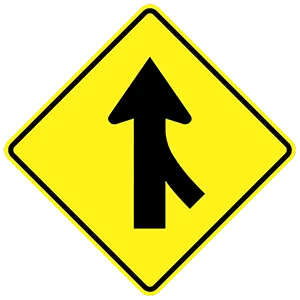Motorcycle Test | License NJ 2026 | FREE Online Practice! #4 Page 5 of 7
Take this FREE motorcycle test (license in NJ 2026) to check your knowledge of the road rules. To improve your results, download a motorcycle handbook online, study theory, and practice for free on our website. Still worried about how to get a motorcycle license in New Jersey in 2026? Check our website for more sample tests, train as much as possible, and boost your grades!
29 . Impairment from drinking alcohol occurs:
It is never safe to operate a motorcycle after consuming any amount of alcohol. Impairment of the skills needed to safely ride begins well below the legal limit.
30 . This road sign means:

This sign indicates a merge ahead. It warns that two lanes of traffic moving in the same direction are about to become one.
31 . You will ______ hear a tire going flat.
Motorcycle riders will rarely actually hear a tire going flat. Tire failure is more often indicated by a change in how the motorcycle handles.
32 . In hot weather, wearing a riding jacket:
A riding jacket and long pants should still be worn when riding in hot weather. In addition to their other safety benefits, they can protect a rider from heat exhaustion and dehydration.
33 . How many alcoholic drinks need to be consumed before a rider may begin to feel the effects?
As little as one alcoholic drink can affect a person's ability to ride. It is both illegal and dangerous to ride a motorcycle while under the influence of alcohol.
34 . If your rear wheel locks while braking, you should:
If your rear wheel locks while braking, do not release the brake. Instead, keep it locked until you come to a full stop.
35 . You’ll have a better chance of avoiding serious injury if you wear all of the following, except:
To protect yourself against injury, you should wear a DOT-compliant helmet; face or eye protection; a jacket and long pants made of sturdy material; boots or shoes that are high and sturdy enough to cover and support your ankles; and gloves made of durable material.
See the exact questions that will be on the 2026 New Jersey DMV exam.
99.2% of people who use the cheat sheet pass the FIRST TIME
Jeneen was tired of paying $5/gallon. She got herself a scooter that required the motorcycle license. She studyed the motorcycle test cheat sheet and passed her test the next day!
Christopher tells us how he knew nothing prior to obtaining the motorcycle study guide, and he only got one question wrong because he clicked on the wrong answer by mistake.



